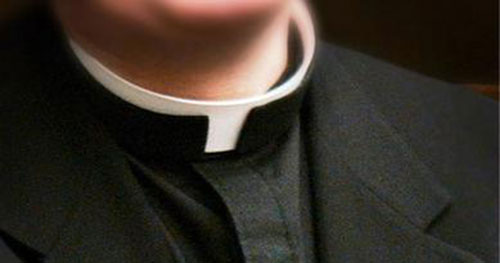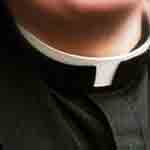
This post continues the reflection around Cardinal John Dew’s letter calling on the addressing of priests as “Father” to stop as it, according to him, has been integral to the Roman Catholic sexual abuse crisis. [Previous posts are here and here].
I am unconvinced.
I would note, in passing, that calling a Cardinal “Father” would be surprising – so Cardinal John Dew’s own title would remain untouched.
The letter in which Cardinal John Dew makes the announcement refers to the Bishop of Rome always as “Pope Francis” – no prizes for knowing that “Pope” is a synonym for “Father”. Having called him Pope Francis, Cardinal John Dew goes on to refer to him as “The Holy Father”. Doing so, I suggest, undermines the very point he is trying to make. It is like a parent hitting a child again and again whilst saying, “I have told you to never hit people!”
From responses to the previous posts, it is clearer to me that diocesan priests for a long time were not referred to as “Father”. Those in monasteries (from “Abbot” = father) were increasingly called “Father”. From there the address spread to priests in Religious Orders (beyond monasteries). And, it seems, from there it extended (apparently a lot through the spread of Irish Roman Catholicism) to diocesan priests. Somewhere in that history must be when it spread into Anglicanism (and beyond).
There are some parallels in other languages. “Pater” is the Dutch for a monk or a priest who belongs to a Religious Order. Otherwise it is “pastoor” [the connections are pretty straightforward, I hope]. “Don” is the Italian for a diocesan (“secular”) priest. “Fra” would be the equivalent in a Religious Order. In Greek: παπάς (papás). Spanish: Padre. Fascinatingly, “padre” is the address used in English for Naval, RAF and Army chaplains. And, curiouser and curiouser: in Spanish, while “padre” is used for priests, the Latin “pater” is used for military chaplains!
I would also add into the mix that I think there is far too much neglect of the baptismal names of Christian leaders.
Finally, from this discussion, was the point that if (as per Deborah Pead’s point) Catholicism needs re-branding, one thing that might need to go is the uniform of the clerical collar (image above). Certainly, I was relentlessly conscious, once the extent of the clerical sex abuse crisis became clearer, that my wearing the same uniform as the abusers meant a complex of associations – including sharing in the abusers’ guilt by association.
Just as I find myself lumped in with Christians whose following of Jesus leads to their holding positions and acting in ways that are often directly opposite to mine (and IMNSHO opposite to Jesus’), so, when I wear a clerical collar, I can be lumped in with others who wear it and have worn it.
It is pretty standard to find an article on priestly sex abuse illustrated with a clerical collar – akin to what heads this blog post. In saying I follow Jesus, I hope, often faintly, that I can change the negative view regularly held of Christians. In wearing the clerical collar, I hope, often faintly, that I can change the negative view regularly held of priests.
If you appreciated this post, consider liking the liturgy facebook page, using the RSS feed, and/or signing up for a not-very-often email, … if you are on Instagram, please follow @liturgy.




I’m unconvinced too: Australia’s Royal Commission into institutional responses to child abuse looked at a range of institutions where abuse had occurred. The Catholics were among the perpetrators – but so was the Anglican Church (where most clergy aren’t called Father), the Salvation Army (no Fathers), the Australian Christian Churches (Pentecostals, no Fathers), the Jehovah’s Witnesses (no Fathers), the Uniting Church (no Fathers) and so on. Jewish schools (no Fathers), a yoga ashram (no Fathers), Scouts (no Fathers), Swimming Australia (no Fathers) and others were all investigated and found wanting. I don’t think it’s the form of address that’s the problem, but rather the lack of appropriate measures to look after kids, and the reticence to report crimes to civil authorities. Those defficiencies weren’t by any means solely owned by the Catholic Church.
I have refused to use the term ‘Father’ since at least the early 70s, when still Catholic. Now as an Anglican in Wellington, it’s never used, in my hearing anyway. I applaud John Dew
As to the development of clerical garb, the clerical collar is an over-glorification of the undershirt (that often also served as a nightgown/nightshirt) worn under cassocks. The shirts had frilly or lacey collars and cuffs that extended beyond the cassock’s collar & cuffs. Cassocks are derived from the Roman tunic and were worn by clergy in both the East and the West, but have tended to evolve differently after the Great Schism. Cassocks in the West were originally closed at the neck until Jesuits serving in the Far East adopted cassocks with Mandarin-style collars and imported them back to Europe. Ambrosian cassocks are still closed at the neck today.
The frills were later toned down to a plain standup collar and cuffs that still extended beyond the cassock. This became so identified with the ordained that clerical clothing designers have gone to almost ridiculous lengths to maintain the look, developing dickies and then tailored shirts with plastic tabs to mimic the undershirt & cassock of yore, when modern clerics adopted tailored black suits.
The extent to which clerical garb and honorifics have been stretched to ridiculousness is betrayed by terminology employed by the uninformed, especially in denominations which have adopted their use but appear uneducated in the terminology. I have personally had two experiences with each which made me cringe upon hearing them and feel embarrassed for the foolishness of the speakers. Both were women preparing for ordination in a relatively recently (20th Century) established denomination. The first stated publicly that she was to be collared in the coming week. The second spoke publicly about being reverendized regarding her upcoming ordination.
As to calling priests or ministers, Father, that has never been a bugaboo for me. I call them whichever they wish or are most comfortable; Father, Mother, Pastor, given name, etc. Because I understand honorifics are not titles, I always use the requisite ‘the” in written and spoken form. I also prefer the abbreviation of the Revd over the Rev.
IIRC, there was a time, years ago, that you seemed uncomfortable when I referred to you as Father B in my comments here and would correct that in my comments before publication, but one day you stopped correcting me! 🙂
‘I was relentlessly conscious, once the extent of the clerical sex abuse crisis became clearer, that my wearing the same uniform as the abusers meant a complex of associations – including sharing in the abusers’ guilt by association.’
I think we all feel the same ‘guilt by association’ in any helping or spiritual career Bosco, I hate the humanitarian crisis with the immigrant children in detention here in the US. People on all levels know there is neglect happening, how difficult can it be to buy a bunch of children mattresses and books and childcare workers, food?
The solutions are out there, but who is going to make sure things get fixed?
I sang a song for a memorial service a few days ago:
‘I the lord of sea and sky
I have heard my people cry
All who dwell in dark and sin
My hand will save;
I have made the stars of night
I will make their darkness bright
Who will bear my light to them?
Whom shall I send?
Here I am Lord
Is it I Lord?
I have heard You calling in the night.
I will go Lord
If You lead me
I will hold Your people in my heart.
I the lord of wind and flame
I will tend the poor and lame
I will set a feast for them
My hand will save;
Finest bread I will provide
Till their hearts be satisfied
I will give my life to them
Whom shall I send?
Here I am Lord
Is it I Lord?
I have heard You calling in the night.
I will go Lord
If You lead me
I will hold Your people in my heart…’
( Anna Laura Page and Daniel L Shutte )
There are several good renditions on Youtube. Note the stars are mentioned again; our earliest human spiritual inspiration!
Thanks, Tracy. I know the song well. Blessings.